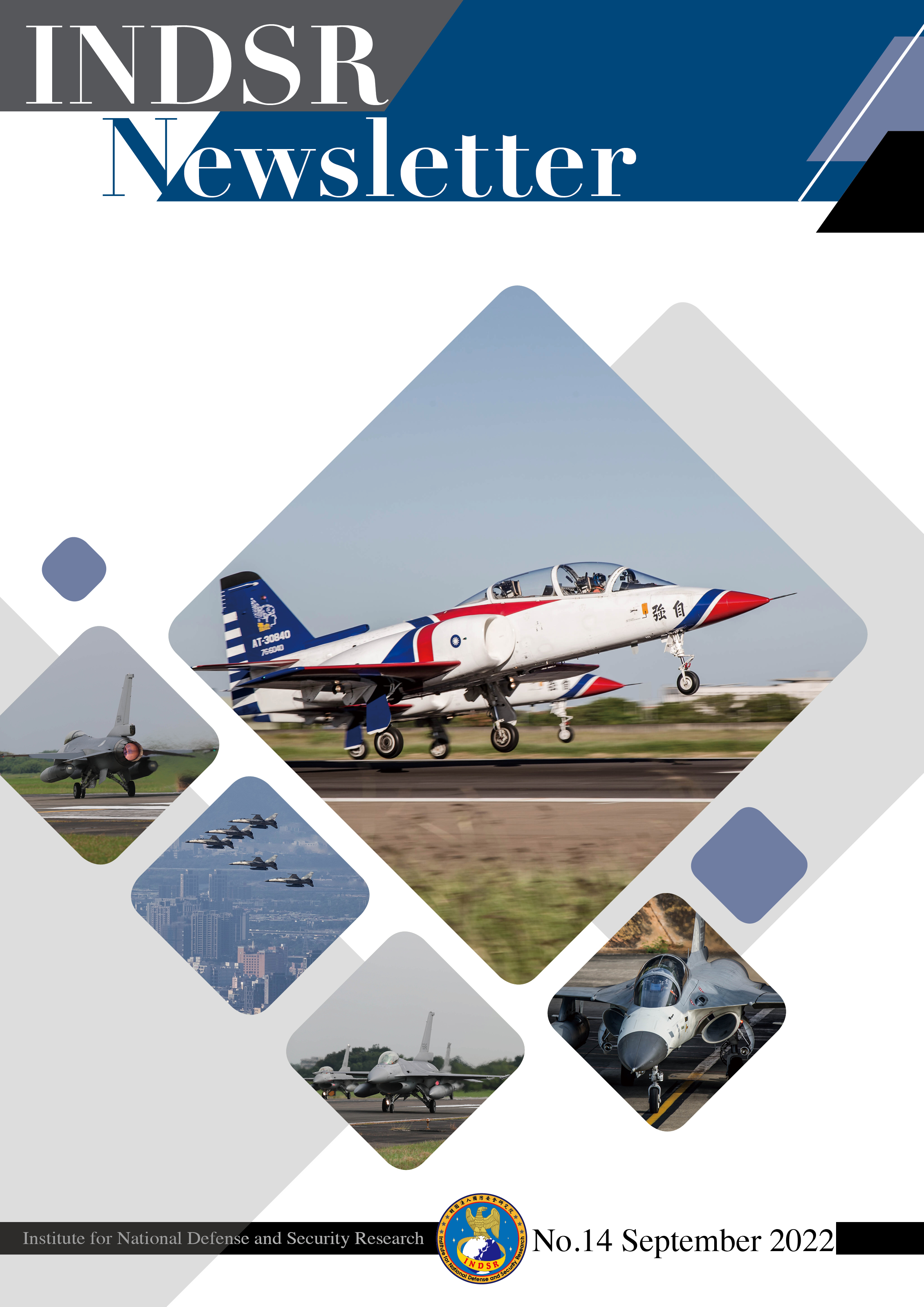Public Opinion on “Strengthening Our National Defense Capabilities” Facing CCP Military Exercises Around Taiwan
2023.02.10
Views
1072
PDF link:
On August 2, 2022, United States House of Representatives Speaker Nancy Pelosi visited Taiwan, and the CCP announced plans to hold live-fire drills in six maritime areas encircling Taiwan. The PLA fired ballistic missiles across Taiwan through the atmospheric layer into Taiwan’s eastern waters, organized Naval Air Forces, and crossed the Taiwan Strait median line,[1] conducting joint air and sea operations.[2] This article aims to explore how the CCP drills affect Taiwan's national morale through the use of opinion polls.
This telephone opinion survey is conducted by the Election Study Center, NCCU, on behalf of INDSR; the survey subjects are adults over 20 years old in Taiwan, excluding the outlying islands of Kinmen and Matsu. The survey was carried out between August 3-7, covering Pelosi’s visit and the CCP drills. During the survey, 753 landline samples and 322 mobile phone samples were completed (1,075 samples in total). The samples were rank-weighted according to gender, age, education, and place of residence. They were not significantly different from the statistical population and sufficiently representative of the public, with a maximum possible random sampling error of ±2.99% estimated at a 95% confidence level.
Pelosi’s visit to Taiwan has enhanced the people's trust in the U.S. security promise
This opinion poll shows more than 60% of the Taiwanese people support Pelosi’s visit (Figure 1). In a cross analysis with the basic demographic variables of the respondents, we found that a majority of the respondents supported Pelosi's visit to Taiwan regardless of their gender, age, and education level (including categories for “very” and “somewhat” supportive). There is a clear difference in attitude towards Pelosi’s visit to Taiwan between those who identify with different political parties. Ninety-one percent of the pan-Green identifiers support Pelosi’s visit to Taiwan, while 52% of the neutral respondents support Pelosi’s visit to Taiwan, and only about 40% of the pan-Blue identifiers support Pelosi’s visit to Taiwan.
This opinion poll shows more than 60% of the Taiwanese people support Pelosi’s visit (Figure 1). In a cross analysis with the basic demographic variables of the respondents, we found that a majority of the respondents supported Pelosi's visit to Taiwan regardless of their gender, age, and education level (including categories for “very” and “somewhat” supportive). There is a clear difference in attitude towards Pelosi’s visit to Taiwan between those who identify with different politica
Figure 1: Taiwanese people’s attitude towards Pelosi’s visit
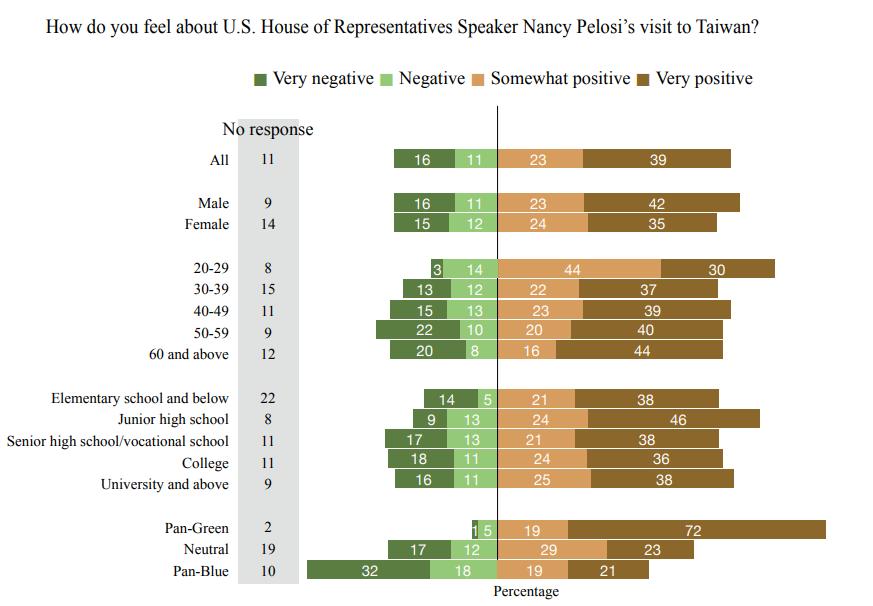
Note: (1) How do you feel about U.S. House of Representatives Speaker Nancy Pelosi's visit to Taiwan? (2) No response includes “No comment”, “don't know”, and “Refuse to answer”.
In fact, Taiwan and U.S. officials and lawmakers have been visiting each other for a long time. It not only improves the substantial relationship between Taiwan and the U.S.; for most people, it also signifies the U.S. security promise to Taiwan, which is a great morale booster. Our opinion poll question is, “If a war were to break out between Taiwan and China, do you think the U.S. will back Taiwan?” We use this question to see how much trust Taiwanese people have in the U.S. security promise to Taiwan. Figure 2 shows, that in September 2021, 57% of the Taiwanese people believed if a war were to break out between Taiwan and China, the U.S. would back Taiwan. But in March this year (2022), due to the impact of the Russia-Ukraine war, the percentage dropped to 40%. After Pelosi’s visit, the percentage bounced back to 50%. From here, we can see the visit of U.S. senior officials to Taiwan has helped enhance Taiwanese people’s trust in the U.S. promise to defend Taiwan.
Figure 2: The trend of Taiwanese people’s attitude towards U.S. promise to defend Taiwan
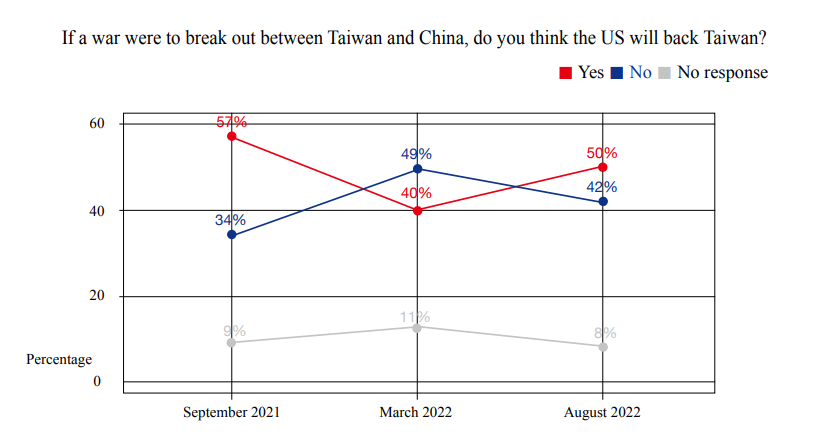

Note: (1) Yes includes “Definitely” and “probably”; No includes “Probably not” and “Definitely not”. (2) No response includes “No comment”, “don’t know”, and “refuse to answer”.
60% of the Taiwanese population have confidence in Taiwan’s military strength
In response to the CCP exercise, Taiwan’s military deployed various equipment to monitor enemies and sent air and sea forces to stop the CCP military aircraft and ships from approaching Taiwan’s air and seas. People saw the composure and courage demonstrated by the Ministry of National Defense, R.O.C. This is reflected in the opinion poll (Figure 3). We discovered nearly 60% (59%) of the Taiwanese people have confidence in Taiwan’s military strength, the highest since September 2021. In other words, the PLA exercise didn't demoralize the Taiwanese people. Instead, seeing Taiwan’s military’s appropriate response and demonstration of military strength, people have gained more confidence in the military.
Figure 3: The trend of Taiwanese people’s confidence in Taiwan’s national defense
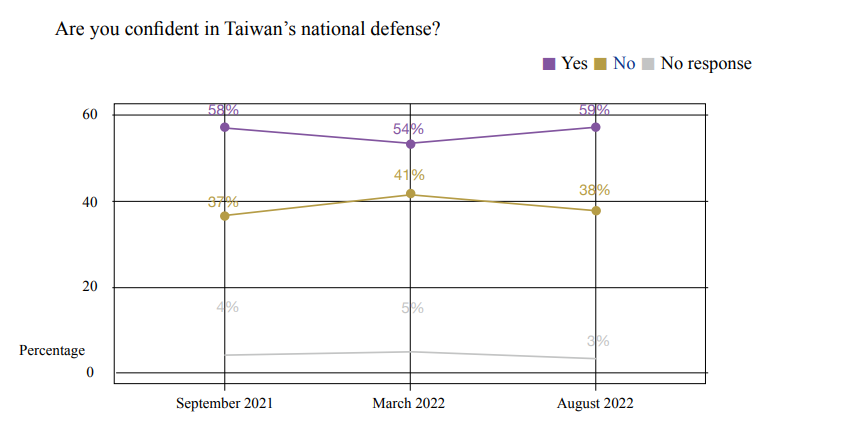
Note: (1) Yes includes “very confident” and “quite confident”; No includes “slightly confident” and “zero confidence”. (2) No response includes “No comment”, “don't know”, and “refuse to answer”.
People believe strengthening Taiwan’s defense capabilities is a top priority
Faced with the grand CCP military exercise, the poll asks, “What do you think is the most important measure for our government to take to maintain national security and regional peace?” The result shows out of all respondents (Figure 4), 51% state the most important measure to maintain national security is to strengthen our own defense capabilities; 18% believe it's to work closely with the U.S., and 23% think it’s to extend an olive branch to China. Further cross analysis shows that the idea of prioritizing “strengthening our own defense capabilities” is shared by a majority of people of all gender, age, and educational level, with only a clear divide between Blue and Green supporters, in terms of the ways to maintain Taiwan’s national security. If we set aside political disputes, “strengthening our own defense capabilities” is not only a priority for the majority of the people but also the biggest common ground for safeguarding our national security. In the face of the looming threat from China, it is imperative to strengthen our defense capabilities, raise awareness and build consensus among all people.
Figure 4: The most important measure to take to maintain national security and regional peace
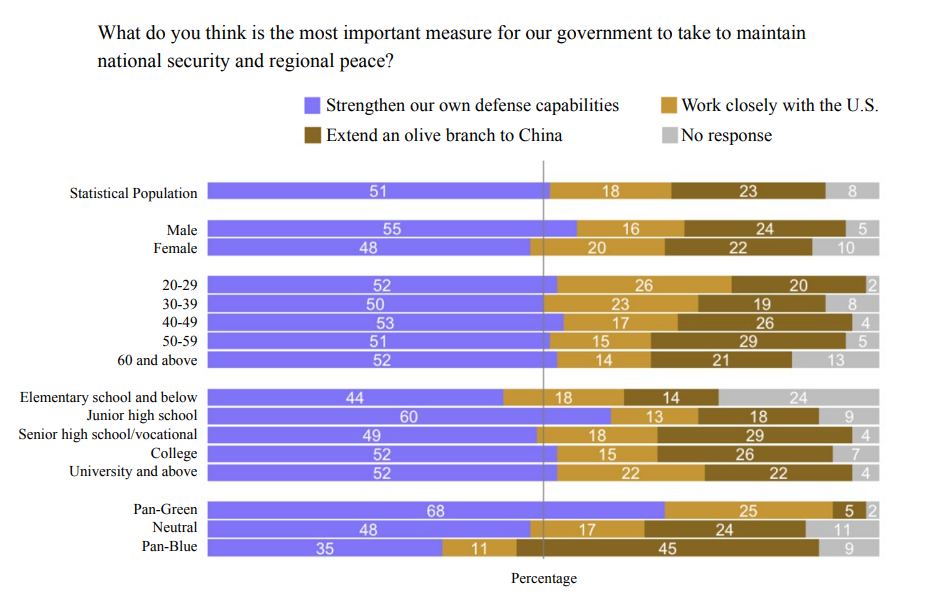
Note: (1) No response includes “No comment”, “don’t know”, and “refuse to answer”.
(Originally published in the “National Defense and Security Real - time Assessment”, August 16, 2022, by the Institute for National Defense and Security Research.)
(The contents and views in the assessments are the personal opinions of the author, and do not represent the position of the Institute for National Defense and Security Research.)
[1] For related reports, see Lu Jiahong, “Pelosi’s Visit to Taiwan: China’s Strategy of Military Exercises around Taiwan with Ballistic Missiles ‘Flying across Taiwan’ and Public Reaction, BBC Chinese, August 5, 2022, https://reurl.cc/D3dOL6; “Ministry of National Defense Issues Press Release on ‘whether Ballistic Missiles Launched by the Chinese Communist Party Targeting Our Eastern Waters Flew over Taipei’,” Ministry of National Defense of the Republic of China, August 4, 2022, https://pse.is/4c2463.
[2] August 7 Press Release on Airspace Dynamics around Taiwan Strait,” Ministry of National Defense of the Republic of China, August 7, 2022, https://pse.is/4dxjkv.

